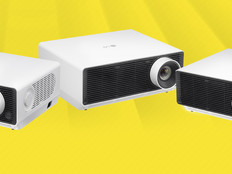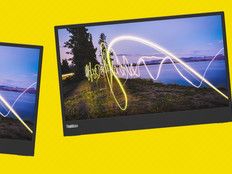Refreshing Ideas
Like the stark red-rock canyons and desolate, hard-scrabble desert that characterize the northwestern Arizona county for which he works, Nathan McDaniel demands respect. If he doesn't get it, you're toast.
Such is the case for a computer manufacturer whose PC lease McDaniel recently opted not to renew. "The people there seemed more interested in technicalities and fine print than in retaining our business, and that was the primary reason we decided to make a move to a new vendor," says McDaniel, IT director for Mohave County, headquartered in Kingman and home to parts of Grand Canyon National Park and the Mojave Desert.
In search of an organization that "valued our business and us as customers," Mohave County turned to CDW·G, with which it had good experiences buying cables and other small-scale peripherals, McDaniel says. "At the time that other relationship went sour, we remembered that CDW·G leases everything it sells, and so we started up a conversation with our account reps about leasing PCs," he adds.
Nathan McDaniel of Mohave County, Ariz., recommends obtaining pre-configured PCs to greatly reduce the rollout burden.
Photo credit: Jared McMillen/Aurora Select
The IT staff selected Lenovo machines and in December 2009 took receipt of 300 desktops, notebooks and workstations and began migrating users from their old machines to the new ones. McDaniel and his team finished the refresh by late January and have encountered no problems with the computers thus far, he says.
Choosing a make and model of desktop or notebook is but one aspect of a PC upgrade. McDaniel and other experts apply several strategies to smooth the systems migration process.
Examine the Full Lifecycle
"The first thing you need to do is look at the PC lifecycle, which we define as any touch point that the IT department or third party has with the PC, from pre-purchase through retirement," says Leslie Fiering, a research vice president at Gartner.
Think chronologically about what needs to happen with the PC each step of the way, she says. In implementation, for example, take into account tasks such as configuring the hardware, developing the system image, tagging the asset, delivering the unit to the desktop and migrating users from the old to the new.
Operationally, think about processes for repairs, software updates, patch management, training and vendor coordination. For retirement, for example, be sure to determine who's going to box up and physically remove the PC, sanitize the hard drive and reclaim licenses.
Once you've established all the steps that are critical to your environment, "then you can figure out who is going to deliver those services," Fiering says. You can manage the migration internally, choose a manufacturer's services or hire a third party such as a value-added reseller. You can mix and match the servÂice delivery options between internal and external providers, as long as you have clear-cut guidelines for determining responsibility, Fiering adds.
It's More than the Machine
These days, a PC is a PC is a PC. As McDaniel says, "the innards are all pretty much the same from one manufacturer to the next."
Still, as you're looking to refresh a batch of desktops, don't be fooled into buying a less expensive brand just because what's inside is similar to the guts of a mainstay manufacturer's machine, advises Wendi Wagner, technical support supervisor for DuPage County in Wheaton, Ill. If you don't stick to main PC brands, you could run into support issues, she says.

Standardization of PC brands and models eases support woes for Wendi Wagner in DuPage County, Ill.
Photo credit: Todd Winters
For DuPage County, Wagner says she looks for brand-name machines with three-year warranties and easy-to-find, inexpensive parts. "The more people you need to support, the cheaper it is to stick with higher-end manufacturers," she says.
Also consider a single-vendor environment to ease desktop support challenges, Wagner says. "Years ago, we looked at a handful of major vendors and made our decisions on price. As a result, we ended up with various vendors throughout the county, which made technical support difficult."
But about four years ago, the county shifted its emphasis. "We realized how much easier dealing with a single vendor is when you're trying to support all those machines," says Wagner, noting that HP is now the provider of choice for the county for desktop computers, servers and network gear.
Wagner also prefers to order the same model for all the desktops targeted in a refresh. "If they all have the same memory type, that makes upgrades easier, and keeping parts in stock is easier if you've got 200 of the same models," she explains.
Use Imaging Software
Imaging technology can ease the job of rolling out PCs.
After Mohave County chose the primary hardware -- the Lenovo ThinkCentre M58 -- McDaniel ordered a single machine with the configuration desired for the full fleet of new PCs. IT installed the required software, including line-of-business applications on that machine, and tested the configuration thoroughly. Once IT deemed the configuration satisfactory, it used Symantec Ghost to create an image that it sent to CDW·G for custom factory integration on its Lenovo machines.
"We get our machines basically pre-configured with all necessary software installed," McDaniel says. "We then only have to make minor changes sometimes at a user's desktop, like checking a checkbox."
Repurpose PCs as Necessary
IT spending remains tight at state and local governments around the country, forcing extended refresh cycles at many organizations. That may mean getting a bit creative with how you dole out new machines, Wagner says.
"It would be nice if we could get a new machine in and retire the old one, but that doesn't work," she says.
Most of DuPage County's 1,000 or so desktop users don't need beefy machines with high-end processors and lots of memory to run Microsoft Office and mainframe programs. But some users, such as those who rely on 3D AutoCAD software for work on the county's geographical information system, require hardier PCs with up-to-date processors and memory. During a refresh, power users receive the new machines while IT rebuilds the old machines and hands them down the ranks, DuPage County's Wagner says.
"This makes more work for us, but it saves money -- and these are still usable machines that users are happy to get," she says. "From where they sit, our rebuild looks like a new machine."
Be a Tough Negotiator
In Washington state, the Department of Information Services (DIS) works with state agency representatives to create standard PC configurations that it then presents to contracted manufacturers for pricing. (The state participates in the Western States Contracting Alliance.) "Within the overall pricing structure, we're able to affect a very specific set of pricing that really meets the majority of our use cases," says Steve Lovaas, manager of technology acquisition services for the state.
$7,000
Estimated cost of a memory upgrade to extend the life of 234 DuPage County PCs
The pricing-request process reduced overall PC pricing by 15 percent, adds Scott Smith, the state's planning and design manager for telecommunications. "We take the standard configuration to the contracted vendor community for prices, and publish those on a website for all the world to see," he says. "For the first time, we can compare apples to apples, spec to spec, the pricing among all the manufacturers."
Because state agencies could easily compare manufacturers, vendors stopped trying to distinguish themselves on components and "did their own form of price-leveling," dropping prices even in the absence of volume commitments, Smith says.
"What we're trying to accomplish here is ... to take that price question away from our customers so they can focus on the lifecycle issues of managing personal computers," he adds.
Keep Security Front and Center
As you're planning a PC migration, don't forget your security basics, advises Kym Patterson, state chief security officer for Arkansas.
"Try to restrict access on a new machine to just what the user is going to need," Patterson says, in particular noting the importance of disallowing admin rights in all but the most necessary cases.
"If admin rights aren't needed on a PC, you don't want to grant a user that because sometimes when malware attempts to infect a machine, it requires administrator rights in order to install itself," she explains.
At the other end of the PC lifecycle, be sure not to release any machines -- no matter where they're destined -- without first wiping the hard drives, advises Gartner's Fiering. In Arkansas, Patterson relies on software that conforms with U.S. Department of Defense standards to wipe data from hard drives. If sensitive data can't be wiped from a drive, more extreme measures might require that the drive be destroyed entirely, she adds.
"If you don't have software for wiping the drive, you could degauss with a huge magnet or, as a last resort," Fiering says, "drive a nail through it."
Or, as McDaniel would no doubt do in Mohave County, make it toast.
Lease or Own?
Here are three reasons why you may want to consider leasing PCs.
- Enforced lifecycle management. You've got to send the PC back per terms of an operational lease agreement, which is a nice way of enforcing lifecycle management, says Scott Smith, planning and design manager for telecommunications for Washington.
- Reduced maintenance problems. The older the machine, the greater chance the components will fail. Swapping out old for new PCs every few years means you don't have to worry about failures associated with aging gear, says Nathan McDaniel, IT director for Mohave County in Kingman, Ariz.
- Ability to treat computers as an operational expense. Capital expenses are exceedingly difficult to justify when budgets are tight. Obtaining PCs under an operational lease makes that problem disappear. "We get the benefit of a technology refresh without having to beg for money," McDaniel says.






